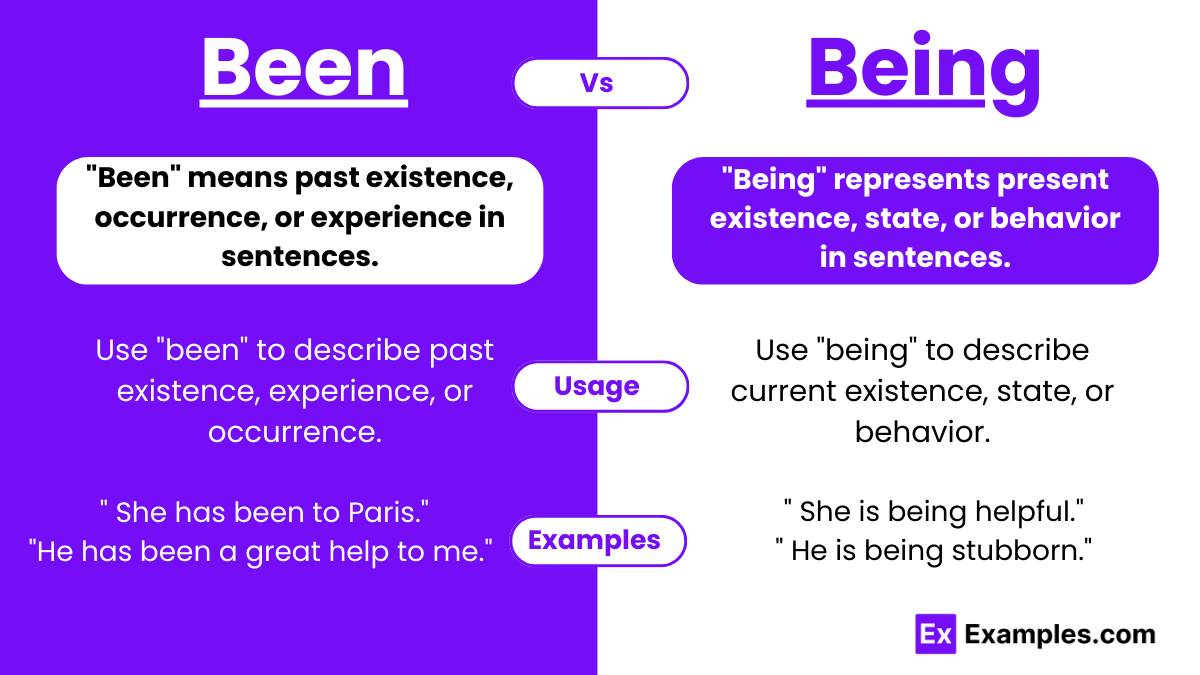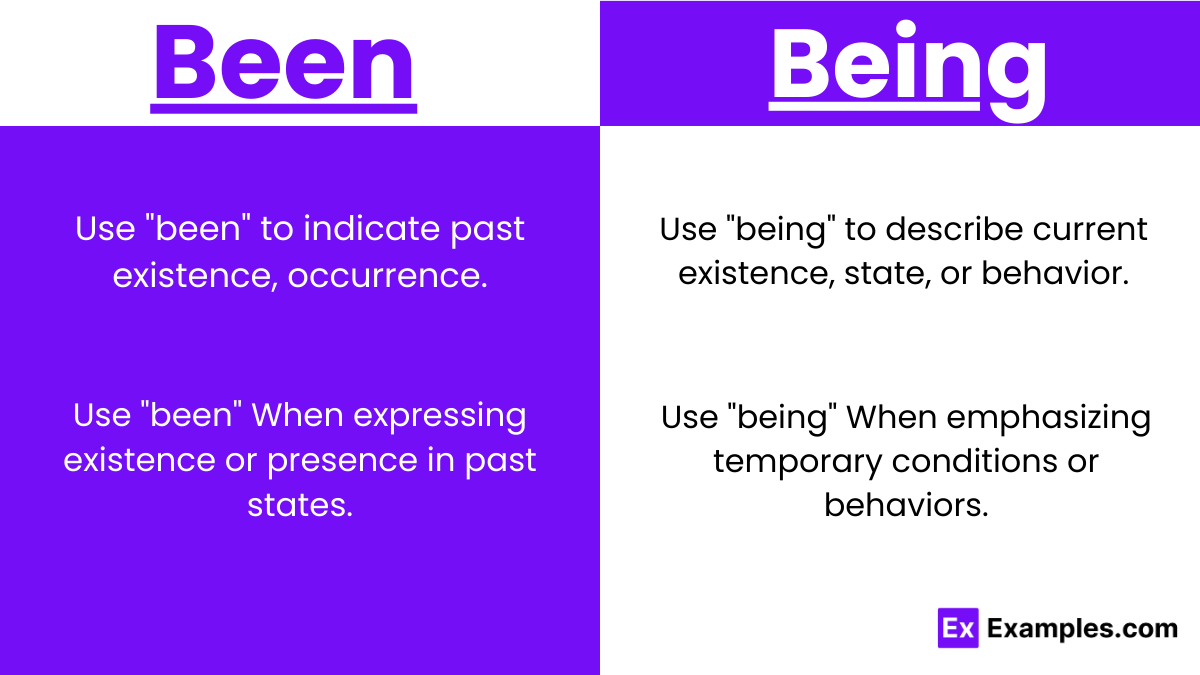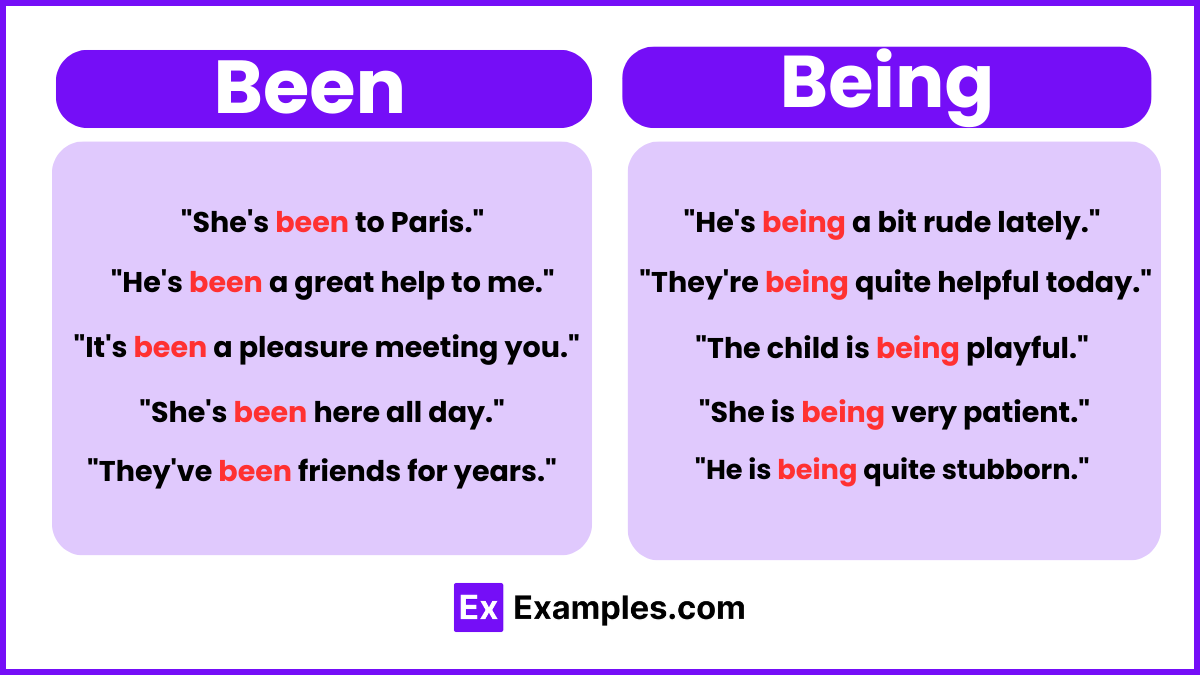Been vs Being – Meaning, Examples, Differences, Usage
“Dive into the comprehensive guide on ‘Been vs Being’ and enhance your communication finesse. Delve into vivid examples illustrating their nuances, understand their effects on clarity, and grasp the telltale signs in usage. Whether you’re crafting formal documents or engaging in everyday conversation, mastering these distinctions is pivotal. Explore how to wield ‘Been vs Being’ effectively to elevate your language precision and amplify your communication prowess.”
Been vs Being – Meanings
- Been: “Been” is the past participle of the verb “to be.” It indicates a state of existence or occurrence in the past, typically used in perfect tenses. For example, “She has been to Paris,” implies that she visited Paris at some point in the past. “Been” often denotes completed actions or experiences up to the present moment.
- Being: “Being” is the present participle of the verb “to be.” It denotes existence, state, or identity in the present or ongoing actions. It’s used in continuous tenses to indicate an action happening at the moment of speaking or over a period. For instance, “She is being kind,” implies her current behavior of kindness. “Being” emphasizes ongoing states or actions in the present.
Summary
“Been” and “Being” are both forms of the verb “to be” with distinct meanings. “Been” functions as the past participle, signifying completed actions or experiences in the past, often used in perfect tenses. For example, “She has been to Paris.” In contrast, “Being” serves as the present participle, denoting ongoing states or actions in the present, utilized in continuous tenses to indicate actions happening at the moment of speaking or over a period. For instance, “She is being kind.” Both forms contribute to conveying different temporal aspects of existence or actions.
How To Pronounce Been and Being
How to Pronounce “Been”:
- Pronounced as [bin].
- The pronunciation starts with the consonant sound [b], followed by the long vowel sound [i:], similar to the “ee” in “seen.”
- The pronunciation ends with the nasal consonant sound [n].
How to Pronounce “Being”:
- Pronounced as [ˈbiːɪŋ].
- The pronunciation begins with the long vowel sound [i:], followed by the consonant sound [ŋ], similar to the “ng” in “song.”
- The pronunciation ends with the short vowel sound [i], similar to the “i” in “sit,” and the consonant sound [ŋ].
Differences Between Been and Being
| Aspect | Been | Being |
|---|---|---|
| Tense | Past | Present Continuous |
| Form | Past Participle of “to be” | Present Participle of “to be” |
| Usage | Indicates completed actions or states | Denotes ongoing actions or states |
| Examples | “She has been to Paris.” | “She is being kind.” |
| Function | Highlights past experiences or actions | Emphasizes current or ongoing behavior |
How to Remember the Differences Between “Been” and “Being”
Temporal Focus:
- “Been” refers to past experiences or actions.
- “Being” emphasizes ongoing states or actions in the present.
Verb Form:
- “Been” is the past participle of “to be,” used in perfect tenses.
- “Being” is the present participle of “to be,” used in continuous tenses.
Experience vs. Existence:
- “Been” denotes past experiences or completed actions.
- “Being” indicates present existence or ongoing behavior.
Action vs. State:
- “Been” relates to actions or events that have already happened.
- “Being” describes ongoing actions or states of being in the present.
When to Use Been and Being
Usage of “Been”
- To indicate past experiences or actions that have already occurred, as in “I have been to Paris.”
- In perfect tenses to show completion, such as “She has been studying all night.”
- When expressing existence or presence in past states, like “They have been here before.”
Usage of “Being”
- To denote ongoing actions or states in the present moment, as in “She is being helpful.”
- In continuous tenses to describe actions happening right now, such as “I am being patient.”
- When emphasizing temporary conditions or behaviors, like “He is being stubborn.”
Been and Being Examples
Examples with “Been”
- She has been studying for hours.
- They have been to that restaurant before.
- I’ve been waiting for your call.
- Has he been to Europe recently?
- We have been friends since childhood.
Examples with “Being”
- She is being very patient with him.
- They are being so helpful today.
- He is being quite stubborn about it.
- Why are you being so rude?
- They are being interviewed for the job.
Synonyms For Been and Being
| Been | Being |
|---|---|
| Existed | Existing |
| Occurred | Existing |
| Taken place | In existence |
| Happened | In being |
| Lived | Currently happening |
| Resided | Present |
Exercise
Instructions: Fill in the blanks with the appropriate word, “been” or “being,” to complete each sentence correctly.
- Have you ever _______________ to Paris before?
- She is currently _______________ interviewed for the job.
- They have _______________ working on this project for months.
- Are you _______________ serious right now?
- I’ve _______________ waiting for this moment my whole life.
- He is _______________ so helpful lately.
- The children have _______________ playing outside all day.
- Is she _______________ considered for the promotion?
Answers:
- been
- being
- been
- being
- been
- being
- been
- being
FAQ’S
Is it correct to say being?
Yes, “being” is correct when referring to present or ongoing states, actions, or behaviors, such as “She is being helpful” or “They are being interviewed.”
In which tense do we use being?
“We use ‘being’ in continuous tenses, such as present continuous (‘She is being helpful’) and past continuous (‘They were being interviewed’). It emphasizes ongoing actions or states.”
Is been being grammatically correct?
Yes, “been being” is grammatically correct. It is used in certain constructions where both the past participle “been” and the present participle “being” are required. For example: “He has been being very helpful lately.”




